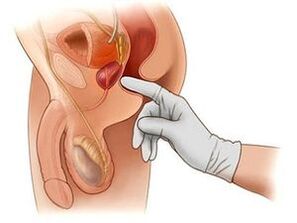At present, the problem of how to judge prostatitis is the concern of more than half of men. Now we are talking about 30-35 year olds with high libido, but this number is decreasing and young people also get the disease. At the first signs, it is necessary to contact a urologist and receive treatment. For this, it is important to know how to recognize prostatitis yourself.
signs of acute form
In the acute form, it is easy to figure out how to recognize prostatitis in men. In fact, it is an inflammatory process that is caused by complications after the common cold. Could be hypothermia, SARS, or acute respiratory infection. This is a viral, fungal, or bacterial infection that accidentally enters the prostate.

In this case, there are several symptoms of prostatitis - how to judge, it is easy for everyone to understand:
- The temperature is over 38 degrees.
- Nausea and vomiting due to poisoning.
- cold and weak.
- Muscle pain.
- Lower abdominal discomfort.
- Pain when urinating.
- There is a small amount of blood in the urine.
- Invasive function.
In this case, you should contact a specialist immediately. The main feature of the acute form is that it can be treated quickly and easily. After a course of treatment and rehabilitation, men can be sure to get rid of all symptoms, including normalization of sexual function.
chronic disease symptoms
The chronic form is more dangerous. In this case, the symptoms are relatively stable and require long-term complex treatment. Often, even after it, relapses occur. It is necessary to seek medical attention as soon as possible, and only early exposure offers hope of recovery. Symptoms include:
- The temperature rose to 37 degrees. This happens intermittently rather than continuously.
- Often want to go to the toilet. At the same time, urination is disturbed and the jet is weak.
- Pain symptoms. The sacrum and scrotum can produce unpleasant sensations.
- Erectile dysfunction, sexual life significantly disturbed.
All of these symptoms greatly disturb any member of the sexually strong. Therefore, it is important to know in advance how to know you have prostatitis and take action.
Difference from other diseases
It is difficult to understand the disease on your own. Symptoms may be similar across diagnoses. There are several reasons why men suffer from genitourinary problems. These may be common diseases:
- Orchitis and epididymitis can cause testicular irritation. Therefore, similar signs may appear, in addition to severe pain when touching the scrotum.
- Urethritis is accompanied by acute pain in the urethra and sometimes it lowers the abdomen in the presence of complications.
- Cystitis is accompanied by a constant urge to go to the toilet and is often associated with urethritis.
- Pyelonephritis means kidney problems, back pain, and blood in the urine.
Many symptoms are indeed very similar. This is why prostatitis should be specifically determined by a professional. A specialist will perform a thorough examination and choose an individual treatment.
Professional diagnosis
Given that symptoms can be similar to many other diagnoses, you should consult a doctor and not self-medicate if any signs appear. The doctor must conduct a thorough examination:
- Rectal palpation. Through the colon, the doctor will be able to feel the prostate and assess its condition and size.
- cytology. Prostate secretion samples are sent to a laboratory and tested for various bacteria and infections.
- Urinalysis. It has to be done in a special way. For one toilet visit, three cups are filled: the beginning, the end, and the middle of urination.
- A prostate ultrasound is done inside the rectum, and it can be used on a device to examine the prostate and the area around it.
- Using electrodes for rheology, the prostate's response to stimulation was measured.
- Uroflowmetry checks for urinary problems. This applies to the speed, duration and interval of toilet visits.
Most men put off seeing a doctor until the last stage. True, the exam is not very pleasant and can cause embarrassment, but keep it healthy.
Often in advanced stages of chronicity, even specialists cannot help with the problem, and symptoms do not go away completely. Rather than suffering from erectile dysfunction and urinary problems for the rest of your life, see your doctor once, get checked out, and be cured.





























